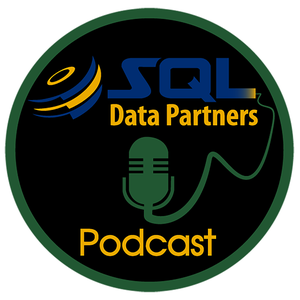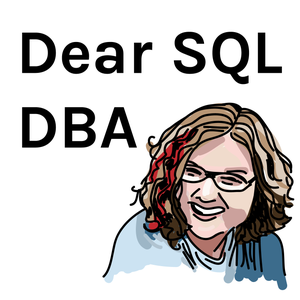
voiceofthedba's podcast
Unknown
A series of episodes that look at databases and the world from a data professional's viewpoint. Written and recorded by Steve Jones, editor of SQLServerCentral and The Voice of the DBA.
- 3 minutes 38 secondsBuilding a Data Center5 February 2025, 12:00 am
- 2 minutes 21 secondsWords vs Data3 February 2025, 12:00 am
- 3 minutes 33 secondsData Debt
I had never heard of data debt until I saw this article on the topic. In reading it, I couldn't help thinking that most everyone has data debt, it creates inefficiencies, and it's unlikely we'll get rid of it. And by the way, it's too late to get this under control. I somewhat dismissed the article when I saw this: "addressing data debt in its early stages is crucial to ensure that it does not become an overwhelming barrier to progress." I know it's a barrier, as I assume most of you also know, but it's also not stopping us. We keep building more apps, databases, and systems, and accruing more data debt. Somehow, most organizations keep running.
The description of debt might help here. How many of you have inconsistent data standards, where you might define a data element differently in different databases? Maybe you have duplicated data that is slow to update (think ETL/warehouses), maybe you have different ways of tracking a completed sale in different systems. Maybe you even store dates in different formats (int, string, or something weirder). How many of you lack some documentation on what the columns in your databases mean? Maybe I should ask the reverse, where the few of you who have complete data dictionaries can raise your hands.
Read the rest of Data Debt
31 January 2025, 12:00 am - 2 minutes 39 secondsCreating vs. Maintaining
If your job as a developer or DBA has been like mine, it's a constant stream of requests to change something, often without enough information and short deadlines that create a bit of stress. There's always more work to be done, and while it might be a great job, you're often trying to finish something quickly enough to get to the next thing.
In this mode, how often do you think about creating (or modifying) the thing you're working on for today vs maintaining it for tomorrow. In other words, do you consider how easily your work can be understood, is documented, is designed to allow for flexibility, and can be enhanced without many (any?) side effects, or anything else.
Read the rest of Creating vs. Maintaining
29 January 2025, 12:20 am - 2 minutes 54 secondsThe Era of Cloned Humans27 January 2025, 12:00 am
- 3 minutes 50 secondsCan You Become a More Productive Engineer?
The short answer is of course, most of us can learn and improve our skills to become better developers, engineers, DBAs, etc. While we might not be able to become the 10x engineer that many aspire to be, we can certainly become a better employee inside of an organization.
There's a piece on becoming a more effective engineer, which is actually titled know how your org works. It a piece from an engineer that started with a tweet: The text was:You can either complain and pontificate on Twitter on how the tech industry *should* ideally work, or you can learn how your org *really* works and what’s rewarded, and optimize for that. Or quit and find another job. This might sound cynical - but it’s what it is.
That sounds a little harsh, but the reality of how your org works or is structured or interacts is a reality. We all have hindsight to look back and wish someone (including us) had written code better. We might be sure if we could change one thing, or add/remove someone else, or make some other change, then things would be better. We might feel that there is a simple solution. Those things might be true, but they aren't the reality of the situation.
Read the rest of Can You Become a More Productive Engineer?
24 January 2025, 12:00 am - 3 minutes 30 secondsThe AI Budget Assistant22 January 2025, 12:00 am
- 4 minutesThe Types of Changes17 January 2025, 12:00 am
- 3 minutes 30 secondsThe Managed Cloud Database Options
There are many, many choices for cloud database services these days. I would hope everyone is aware of the various IaaS options in public clouds with EC2, Azure VMs, GCP Compute Engine, and others. These are often the easiest way to move your workload, but you've really just moved a VM from one place to another (likely more expensive) place.
For managed databases, there are lots of choices, but you might not be aware of your options. I ran across an article that discusses the various flavors of managed databases in the big three public clouds for SQL Server. In the piece, there is a section that talks about when a managed database makes sense. I like that it discloses the development on a managed service is expensive.
Read the rest of The Managed Cloud Database Options
15 January 2025, 12:00 am - 3 minutes 36 secondsSimple(r) Coffee
Starbucks has too many order combinations. This article about the challenges for their new CEO notes there are over 170,000 combinations of things customers can order. As someone who has visited a store often and stood behind someone placing an order, that sounds like an accurate number. Sometimes I hear people order things to drink that I had no idea were even possible.
When there are too many choices, sometimes there can be a delay as the person tries to process the information and make a decision. Some people can't make a decision. Others enjoy the variety and keep making different decisions each time. That's fine if you're visiting a restaurant, but it's less useful if you're building software.
Read the rest of Simple(r) Coffee
13 January 2025, 12:00 am - 2 minutes 14 secondsThe Lesser Used Functions10 January 2025, 12:00 am
- More Episodes? Get the App
- http://www.voiceofthedba.com
- English
Your feedback is valuable to us. Should you encounter any bugs, glitches, lack of functionality or other problems, please email us on [email protected] or join Moon.FM Telegram Group where you can talk directly to the dev team who are happy to answer any queries.
 SQL Data Partners Podcast
SQL Data Partners Podcast
 Dear SQL DBA
Dear SQL DBA
 GroupBy – Free SQL Server Training
GroupBy – Free SQL Server Training
 SQL Down Under
SQL Down Under
 SQL Server Radio
SQL Server Radio